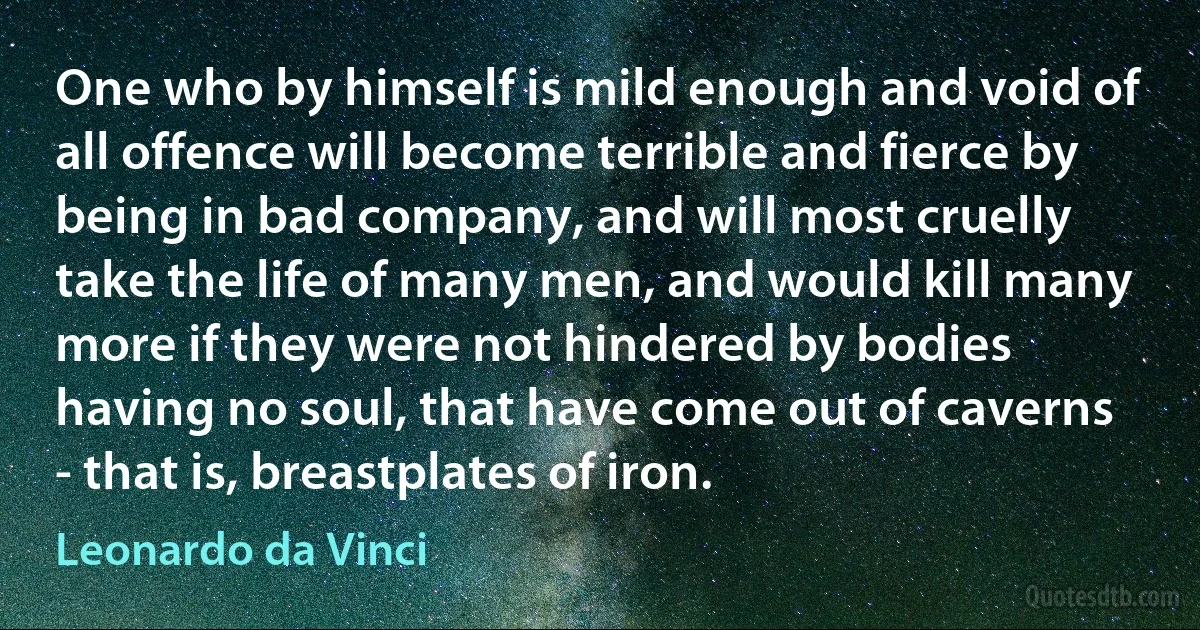Mild Quotes - page 4
If there was in all France, between 1140 and 1200, a more typical Englishman of the future Church of England type than John of Salisbury, he has left no trace; and John wrote a description of his time which makes a picturesque contrast with the picture painted by Abélard, his old master, of the century at its beginning. John weighed Abélard and the Schools against Bernard and the Cloister, and coolly concluded that the way to truth lay rather through Citeaux, which brought him to Chartres as Bishop in 1176, and to a mild scepticism in faith. "I prefer to doubt," he said, "rather than rashly define what is hidden."

Henry Adams
It is only he, possessed of all sagely qualities that can exist under heaven, who shows himself quick in apprehension, clear in discernment, of far-reaching intelligence, and all-embracing knowledge, fitted to exercise rule; magnanimous, generous, benign, and mild, fitted to exercise forbearance; impulsive, energetic, firm, and enduring, fitted to maintain a firm hold; self-adjusted, grave, never swerving from the Mean, and correct, fitted to command reverence; accomplished, distinctive, concentrative, and searching, fitted to exercise discrimination. All-embracing is he and vast, deep and active as a fountain, sending forth in their due season his virtues. All-embracing and vast, he is like Heaven. Deep and active as a fountain, he is like the abyss. He is seen, and the people all reverence him; he speaks, and the people all believe him; he acts, and the people all are pleased with him.

Confucius
The diseases which are hard to cure in neighborhoods... are catarrh, hoarseness, coughs, pleurisy, consumption, spitting of blood, and all others that are cured not by lowering the system but by building it up. They are hard to cure, first, because they are originally due to chills; secondly, because the patient's system being already exhausted by disease, the air there, which is in constant agitation owing to winds and therefore deteriorated, takes all the sap of life out of their diseased bodies and leaves them more meager every day. On the other hand, a mild, thick air, without drafts and not constantly blowing back and forth, builds up their frames by its unwavering steadiness, and so strengthens and restores people who are afflicted with these diseases.

Vitruvius
In both the kinds of land we have been considering [i. e., classes of very fertile soil, rich in humus], we have supposed the humus to be mild, or exempt from acidity. J Sour or acid humus totally destroys the fertility of a soil; sometimes, however, the soil contains so very small a portion of acidity that its fertility is very slightly diminished, and only with regard to some few plants. Barley crops become more and more scanty in proportion as the acidity is increased; but oats do not appear to be at all affected by it. Rye grown on such land is peculiarly liable to rust, and is easily laid or lodged. The grains of all the oereals become larger, but contain less farina. Grass which grows on these spots is, both in species and taste, less agreeable, and less suitable for cattle, than any other, although it yields a very considerable produce in hay. In fact, in exact proportion with the increase of acidity, is the decrease of the value of the soil...

Albrecht Thaer
Parliamentary government is simply a mild and disguised form of compulsion. We agree to try strength by counting heads instead of breaking heads, but the principle is exactly the same... The minority gives way not because it is convinced that it is wrong, but because it is convinced that it is a minority.

James Fitzjames Stephen
What I did was mild compared to what Durocher did to Conlan. I don't see how what I did can be called more serious than the Durocher incident. I had good reason to lose my head. That was the second time they call me out on a play I thought I had beat. That's enough to make anybody mad.

Roberto Clemente
Of all trees, I observe God hath chosen the vine, a low plant that creeps upon the helpful wall; of all beasts, the soft and patient lamb; of all fowls, the mild and guileless dove. Christ is the rose of the field, and the lily of the valley. When God appeared to Moses, it was not in the lofty cedar nor the sturdy oak nor the spreading palm; but in a bush, a humble, slender, abject shrub; as if He would, by these elections, check the conceited arrogance of man.

Owen Feltham
If your path had been smooth, you would have depended upon your own surefootedness; but God roughened the path, so you have to take hold of His hand. If the weather had been mild, you would have loitered along the watercourses, but at the first howl of the storm you quickened your pace heavenward and wrapped around you the warm robe of Saviour's righteousness.

Thomas De Witt Talmage



